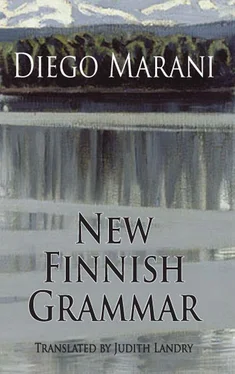‘Where will you go, here in Helsinki?’ it asked me, a buttend clamped between its owner’s lips. He had posed me the same question on the voyage a hundred times. Perhaps he was hoping to catch me out, to discover some inconsistency in my replies.
‘I have the address of a military hospital; and a letter of introduction, from Doctor Friari,’ I told him yet again, in my rough and ready Finnish.
‘Anyway, wherever I go, it’s all the same to me,’ I added.
The officer shifted his gaze towards the city, turned his back on me and replied:
‘This isn’t just any city. It is an encampment of Mongols who surfaced at the other end of the continent by mistake; savages whose only thought is to get drunk, even on ethyl alcohol if they can’t find anything else!’ Pleased with his words, he turned around and drew deeply on his cigarette.
‘Welcome to Helsinki!’ he added sardonically, then walked away, tossing the butt end into the sea. Perhaps he had had those words stored away for me right from the beginning of the voyage.
I walked away from the port with my knapsack over my shoulder. I felt a slight feeling of nervous excitement, but it was not unpleasant, indeed it was more like a kind of sharp and unaccustomed happiness. Walking in the tracks left by the lorries, between the piles of muddied snow, I felt that I was going to make the acquaintance of my own city, my own country, and that thought filled me with hope. A soldier pointed out the military hospital, on a wide street in the centre of town. I shook the snow and mud off my boots and found myself walking over a red-tiled floor, shiny with wax, and entering a tall, poorly-lit entrance hall. The nurse at the reception desk asked me a quick question which I could not understand. I answered by repeating the introductory sentence which Doctor Friari had taught me, and handed her the envelope marked with the seal of the Tübingen. The woman got to her feet and nodded to me to wait, pointing at the wooden benches against the wall; then she went off elsewhere. I removed my cap and took a deep breath of air, which smelled of a combination of paint and ether. Some petty officers came in through the main doorway and stood chatting in the hallway before going off down the corridor, their voices echoing until they died away behind some door. I listened to them with interest, as though amazed to hear them talking like Doctor Friari. So that was really it — the Finnish language at last, alive and well around me, filling that unknown space with sounds I knew. Within the network of my ear, straining to catch each syllable issuing from the mouths of those men, among so many that were unknown or mangled, certain whole words remained trapped, still living when I caught them. I held on to them, took them apart, compared them to those I knew, repeating them under my breath. They were real, they were already mine!
A soldier who had come to sit on the bench opposite mine now distracted me from my wandering train of thought. He had put his elbows on his knees and let his head droop. Eyes on the floor, he seemed to be following something moving in the geometrical design of the tiles, and every so often he would raise the tips of his boots as though to let something pass by. I noted that he was wearing a jacket like my own: the same dark blue, the same horn buttons, but with badges sewn into the collar. I stretched out my arms and looked at them. I stroked the rough material and thought, yes, this country must indeed be mine.
I did not have to wait long. The nurse appeared from a door opening off the corridor and ushered me into the out-patients’ department. The doctor who received me had already read Doctor Friari’s letter; he had it open in front of him on his desk. I sensed that his worry was how to make himself understood. When he began to talk, he pronounced each syllable unnaturally clearly, letting each word die away before starting on the next. This was helpful. From him I learned that Doctor Mauno Lahtinen, the hospital neurologist, was away at the front in Karelia, but he would soon be back, and would certainly take care of me. For the moment, all they could offer me was a camp bed and food from the soldiers’ mess. The doctor repeated this last phrase in a different voice, perhaps for emphasis. These were words I knew, among the first I had learned on board the Tübingen. He added others which I could not grasp, but they cannot have been important, because he was already looking in another direction. Folding my letter back into its envelope, he put it into an unnamed file among the others heaped up on a cabinet behind him. The doctor noticed me casting a worried look in the direction of the still blank label on the sheet of grey cardboard, but he said nothing to reassure me. Then he stood up, to let me know that our interview was over, and shook me vaguely by the hand.
The nurse took me down the corridor to a large room whose walls were lined with shelves and white-painted cupboards, and handed me some rolled up sheets and blankets. I followed her again, this time through empty dormitories lit by large barred windows, then into a lighter corridor running around a courtyard, and finally into a slightly smaller room, where I counted six camp beds. She stopped at the foot of the last of them, handed me a key bearing the number six, and pointed to an iron trunk. She asked me something I could not understand, then waited for a moment for my answer. She smiled at my perplexed expression, then lowered her eyes, even more at a loss than I. When even the rustle of her uniform had died away, seated on the mattress of that unknown bed I felt all the silence, all the loneliness against which I had battled during my long voyage from Trieste to Helsinki, close up like water over my head. I was like one of those fishes left trapped by the ice under the Arctic sea. I could see light above me, but the call of the deep was stronger. I took off my shoes, somehow managed to cover myself up and fell asleep. It was weeks since I had slept in a real bed.
I was awoken by a bell whose sound seemed to be coming from outside. I had no idea how much time had passed. I heard steps in the courtyard outside the window, a vague sound of voices. I buttoned up the jacket I had not even bothered to take off, put my knapsack into the trunk and went out, following the sound of the bell, to join a queue of soldiers and nurses which was moving in the direction of a white church; on entering it, I saw that everything inside it, apart from the organ, was white too. The daylight was fading, and I could see red reflections of it on the glass of four skylights set into the ceiling. Three gilded numbers hung from a wall to one side of the altar. On the bench I found a missal bound in waxed paper, and a Bible with a red marker. There was a sound of rustling missals, and the singing began. A military chaplain walked up to the altar. He read out several passages from a large volume placed on a tripod; he was wearing a grey uniform, and his hair was so fair that it looked almost white. After he had read from it, he held each page of the book between his fingers before turning it gently over, a candle flickering beside him. The service did not last long, and was punctuated by fervent silences at the end of each hymn. I leafed through that strange Bible, looking from one line to the next, trying to recognize at least the names. I listened to my neighbours’ singing, envious of those mouths so full of words. At the end of the mass, people filed out one by one, though some remained kneeling in prayer.
The smell of the wood and the wax had had a calming effect. I felt safe, out of the clutches of the captain of the Ostrobothnia and the metallic voice of the loudspeakers announcing each station’s name; far from the carriages of the Red Cross train, from the smell of smoke and sweat rising from the endless soldiers asleep on their kit-bags. I too stayed in my pew, clutching that Bible as though to squeeze out of it the prayers I could not say. I felt besieged. Outside that church lay loneliness, and as soon as the last soldiers had filed out of its doors, that loneliness would seep in through the cracks in the wood, from under the door, through every chink and crevice; it would envelop me, sucking away my breath, but leaving me alive. My mind was running through doorless corridors, when I felt a hand on my shoulder and, turning round, recognized the nurse who had showed me to my room. She was with the military chaplain, who bowed his head slightly by way of greeting and said: ‘Tervetuloa taloon!’ (Welcome home!)
Читать дальше












